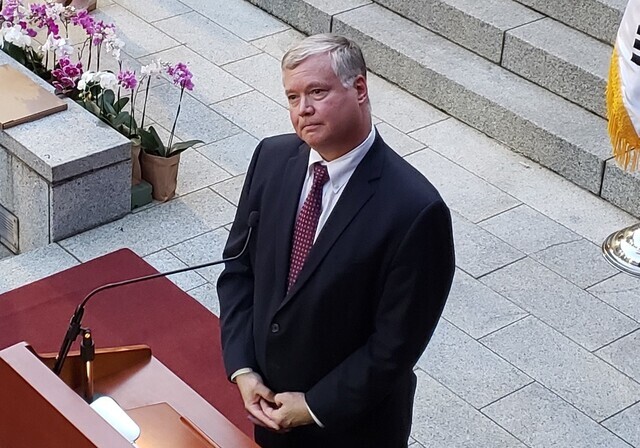hankyoreh
Links to other country sites 다른 나라 사이트 링크
N. Korea-US summit before US president election unlikely, Biegun says

US Deputy Secretary of State and Special Representative for North Korea Stephen Biegun said on June 29 that while the door to diplomacy with North Korea remains open, the likelihood of a North Korea-US summit before the US presidential election in November is slim.
At a video meeting hosted by the German Marshall Fund that day in Belgium, Biegun was asked about the possibility of a summit between US President Donald Trump and North Korean leader Kim Jong-un.
“"I think it's probably unlikely between now and the US election,” he was reported by Voice of America (VOA) as replying, citing the COVID-19 pandemic as one reason.
“In the time remaining and with the wet blanket the COVID-19 has put over the entire world, it's hard to envision circumstances where we could do an in-person international summit,” he continued.
At the same time, Biegun said that the US would “continue to leave the door open to diplomacy.”
“[W]e believe there's still time for the United States and North Korea to make substantial progress in the direction that we believe that both sides want to go,” he said.
Stressing that “our goal remains the final and complete denuclearization of the Korean Peninsula,” Biegun added, “Getting a deal in North Korea is going to depend upon the North Koreans, not just us.”
“We've laid out quite a robust and detailed plan that if the North Koreans would engage with us in negotiation we can make progress very quickly,” he said, urging Pyongyang to adopt a forward-thinking approach.
“[O]ur challenge throughout this process has been North Korea's unwillingness to cease [nuclear weapon production] activities in order to allow a diplomatic process to move forward,” he added.
“The Korean Peninsula [. . .] ultimately hinges upon whether or not the North Korean government is prepared to sit down and discuss substantive steps that will get us [to a brighter future],” he said.
By Hwang Joon-bum, Washington correspondent
Please direct comments or questions to [english@hani.co.kr]
Editorial・opinion
![[Editorial] Yoon must halt procurement of SM-3 interceptor missiles [Editorial] Yoon must halt procurement of SM-3 interceptor missiles](https://flexible.img.hani.co.kr/flexible/normal/500/300/imgdb/child/2024/0501/17145495551605_1717145495195344.jpg) [Editorial] Yoon must halt procurement of SM-3 interceptor missiles
[Editorial] Yoon must halt procurement of SM-3 interceptor missiles![[Guest essay] Maybe Korea’s rapid population decline is an opportunity, not a crisis [Guest essay] Maybe Korea’s rapid population decline is an opportunity, not a crisis](https://flexible.img.hani.co.kr/flexible/normal/500/300/imgdb/original/2024/0430/9417144634983596.jpg) [Guest essay] Maybe Korea’s rapid population decline is an opportunity, not a crisis
[Guest essay] Maybe Korea’s rapid population decline is an opportunity, not a crisis- [Column] Can Yoon steer diplomacy with Russia, China back on track?
- [Column] Season 2 of special prosecutor probe may be coming to Korea soon
- [Column] Park Geun-hye déjà vu in Yoon Suk-yeol
- [Editorial] New weight of N. Korea’s nuclear threats makes dialogue all the more urgent
- [Guest essay] The real reason Korea’s new right wants to dub Rhee a founding father
- [Column] ‘Choson’: Is it time we start referring to N. Korea in its own terms?
- [Editorial] Japan’s rewriting of history with Korea has gone too far
- [Column] The president’s questionable capacity for dialogue
Most viewed articles
- 1Months and months of overdue wages are pushing migrant workers in Korea into debt
- 2At heart of West’s handwringing over Chinese ‘overcapacity,’ a battle to lead key future industries
- 3Under conservative chief, Korea’s TRC brands teenage wartime massacre victims as traitors
- 4[Guest essay] Maybe Korea’s rapid population decline is an opportunity, not a crisis
- 51 in 3 S. Korean security experts support nuclear armament, CSIS finds
- 6Fruitless Yoon-Lee summit inflames partisan tensions in Korea
- 7Trump asks why US would defend Korea, hints at hiking Seoul’s defense cost burden
- 8[Editorial] Yoon must halt procurement of SM-3 interceptor missiles
- 9Dermatology, plastic surgery drove record medical tourism to Korea in 2023
- 10First meeting between Yoon, Lee in 2 years ends without compromise or agreement